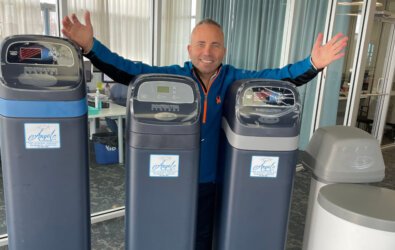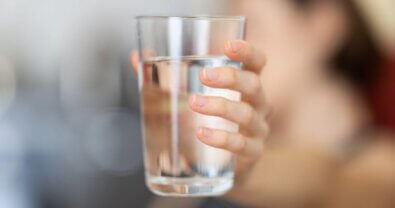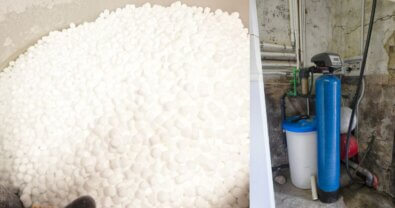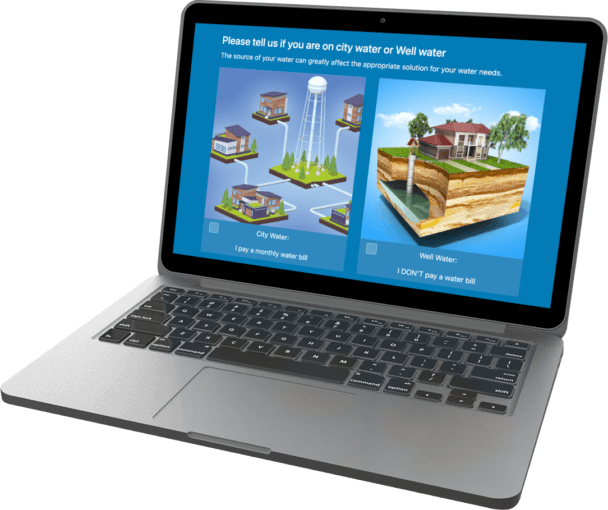Hard Water: How to End the Frustration and Find a Solution
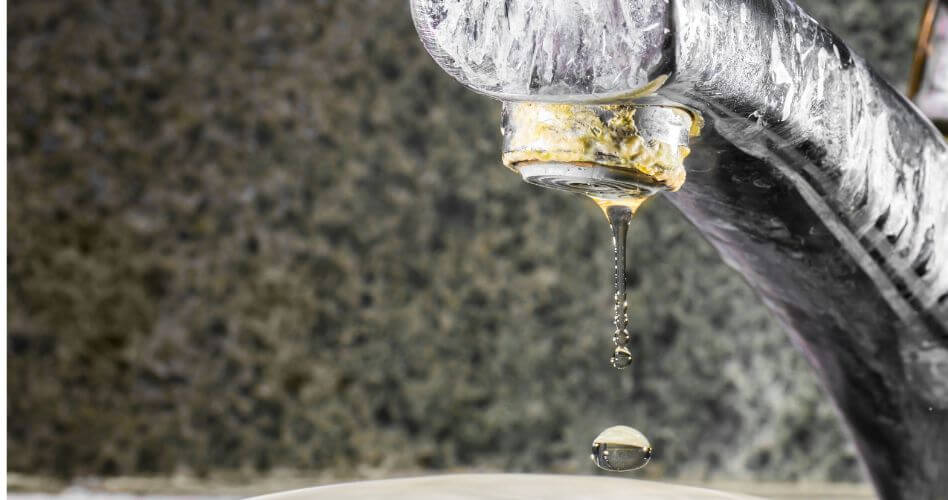
- Hard water contains dissolved minerals (rock) from its natural hydrological process.
- Hard water can damage your clothes, hair, skin and household appliances.
- Hard water can, in some cases, be hazardous to human health.
- A high-quality water softener is your best option for solving hard water issues.
- Angel Water provides high-quality water softeners, installation, maintenance and educational resources.
Are you tired of dealing with glasses that always look hazy and have white spots on your dishes, no matter how many times you clean them? Or, perhaps you’re frustrated with the excessive amount of laundry soap needed to clean your clothes, while a stubborn, white, chalky film keeps building up on your plumbing fixtures. If this sounds all too familiar, you’re likely battling with hard water. We understand your frustration and we’re here to help.
Hard water is a widespread issue, more common than many might think. For instance, the prevalence of red and white areas on this city water map indicates that a significant portion of the United States, including Illinois and Florida, grapples with very hard water.
A second map reveals that groundwater from domestic wells is hard in almost every state. This data underscores the shared experience of dealing with hard water, reassuring you that you’re not alone in this struggle.
But what is hard water, and why should you be concerned if you have it? Below, we answer these questions in detail and, most importantly, provide a solution to end your hard water frustrations.
What is Hard Water?
Put simply, hard water contains a lot of dissolved minerals. Most of that mineral content is calcium and magnesium, which are generally harmless and suitable for human health in appropriate doses. Of course, you can’t be sure your hard water contains appropriate doses for everyone in your family, so that may be a concern – especially for children, older adults and anyone with a health condition that makes these minerals inappropriate for consumption.
Even more concerning is that other dissolved metals could contribute to your hard water issues. These metals aren’t as harmless and include aluminum, barium, strontium, zinc, lead, manganese and iron.
How Does Hard Water Form?
Hard water is formed as part of water’s natural hydrologic cycle. Here’s how it works:
- Water evaporates from the oceans. From here, it’ll eventually be formed into clouds.
- Precipitation (like rain or snow) falls from the sky. At this stage, precipitation generally has very low concentrations of calcium and magnesium but usually does have small concentrations of sodium, sulfate and chloride.
- Precipitation travels from the soil to underground aquifers. While it journeys deeper into the Earth, the water will percolate through a lot of soil and rock. This includes thick layers of gypsum and limestone, which are rich in calcium and magnesium.
- Hard water enters the underground aquifers. The more mineral deposits in your area, the harder the water. These aquifers often feed your home’s well or serve as a city’s water source.
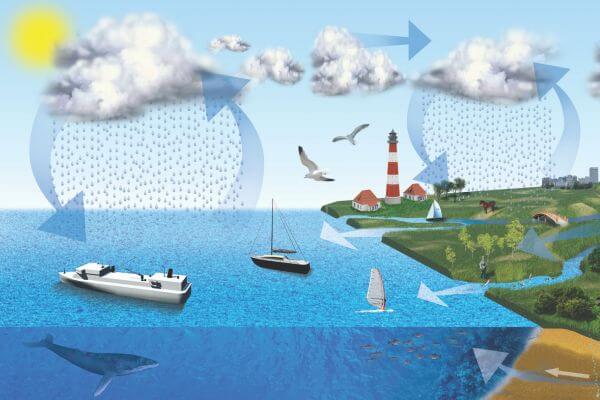
How Do I Know If I Have Hard Water in My Area?
The maps we mentioned above can help give you an idea of whether you have hard water in your area. You can also read through the effects of hard water, which is listed in the section below. If you believe one or more of them are happening in your family or home, there’s a good chance you’re battling with hard water.
But the only way to know for sure is to get your water tested. A water test can tell you if your water has high amounts of dissolved minerals, which positively identifies it as “hard.” Even better, professional water testing can let you know if there are other toxins in your water—like barium or radium 226/228—that are known to cause cancer.
If you haven’t had your water tested recently (or ever) and live in Barrington, IL, West Palm Beach, FL, or nearby either of those locations, Angel Water can help! Our water experts conduct in-home water testing for various toxins and contaminants.
The Effects of Hard Water
Hard water can affect your family and home in many ways. You may only have noticed one or two of these effects or seen many of them. Each case will be different due to varying hardness levels.
Health
We want to be completely upfront with you. Hard water is generally considered safe to drink. However, it should be noted that there are some cases where it might not be. Specific contaminants like barium, lead and iron can make water hard. While calcium and magnesium are the most likely culprits behind your hard water, only a water test can let you know for sure.
These specific hard water contaminants can cause a range of problems. For example:
- Barium: is a soft, silvery, alkaline earth metal with a high chemical reactivity. It’s considered a hazardous substance by all major organizations, and overexposure can cause nausea, vomiting, irregular heartbeat, muscle weakness, tremors, paralysis, kidney damage, liver failure and even death.
- Lead: is a dense, heavy metal. Lead poisoning can cause a range of issues, especially in children. Lead can lead to permanent nervous system damage in children, as well as behavioral disorders and intellectual disability. In all people, too much overtime can lead to coma, seizures, kidney damage, high blood pressure, and much more.
- Iron: Iron is the most common metal element on Earth by mass. Too much iron can cause vomiting, diarrhea, abdominal pain, liver problems, rapid breathing, seizures, low blood pressure, confusion, and more.
Remember, these three metals are unlikely to be the primary cause of your hard water. However, some of these toxins could be infiltrating your water, and only a water test can determine for sure.
Clothes
Hard water can make your clothing discolored or faded, with the results more noticeable after every wash. Why? All those dissolved rocks in the water don’t mix well with the ingredients in your laundry detergent. This can also lead to clothes that feel stiff or still dirty even after washing, causing you to use even more detergent. With time, the costs of extra detergent can become significant.
Plants
Your plants require very specific things to survive. Unfortunately, hard water can interfere with many things your precious flowers need. For example, it can interfere with nutrient uptake, affect water penetration, lead to mineral buildup in the soil, alter soil pH and hamper root health.
The result? Your plants will wither and eventually die if they rely on hard water for hydration.
Skin
Hard water can make your skin feel dry and itchy. Excess minerals found in the water will mix with ingredients in your soap, creating a scum that sticks to your skin and stops moisture from penetrating the way it should. This can lead to peeling, flaking, redness and other annoying side effects.
Want to get more helpful water information delivered to your inbox?
Sign up for our free email newsletter!
If you have skin issues, hard water can exacerbate them. For example, people with eczema or psoriasis may find they’re having more severe breakouts more often. Wrinkles may become more pronounced, and acne breakouts can worsen in many cases.
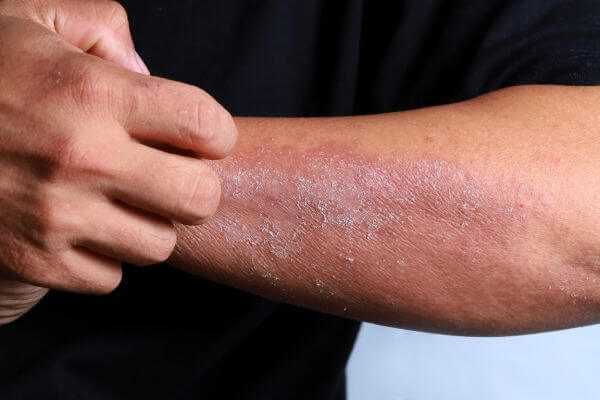
Hair
Do you have nonstop bad hair days? The dissolved rocks in hard water could be to blame. Dissolved minerals in the water can have an effect on hair similar to the one they have on the skin. At a microscopic level, hard water leads to frizzy, brittle hair strands. These strands are more likely to break, leading to many dead ends.
Your scalp isn’t safe, either. Dissolved minerals can deposit on your scalp and lead to a build-up of soap scum. The result is an itchy scalp and many dry flakes that many find embarrassing. The worst part is that no amount of scalp treatments and deep conditioning serums will solve the problem. Only softening the water will have a lasting effect.
Around the Home
Hard water may be considered generally safe for consumption, but it’s definitely not safe for your home. It can lead to a whole string of issues, including (but not limited to):
- Gray stains in your toilet bowl
- Cloudy glassware
- Water spotting on dishes
- A white film of calcium build-up in your dishwasher and water heater, leading to breakdowns
- Cleaning supplies are less effective, so you need more
- Minerals clogging up your plumbing, leading to expensive repairs
The Best Solution to Hard Water Treatment
By now, you know that hard water is a big problem for many reasons. It can affect your home appliances, plumbing system, clothes, hair, nails and maybe even your health. If this news feels overwhelming, rest assured it’s okay.
There’s a solution that will end all your hard water problems… and that solution is a whole-house hard water filter system, better known as a water softener.
A water softener is a special household appliance that removes dissolved minerals and harmful toxins from tap water. The process can vary slightly from one system to another, but the best models use salt and a hard water filter to achieve the best results. Newer models even come with features like remote system monitoring and notifications, taking the guesswork out of when to add salt or have your system maintained.
Of course, who you buy your system from matters almost as much as which system you buy. After all, the distributor will not only affect your entire purchasing experience, but they’ll also be the ones holding your warranty. You want a company you can trust to do the right thing if anything goes wrong with your life-changing water softener.
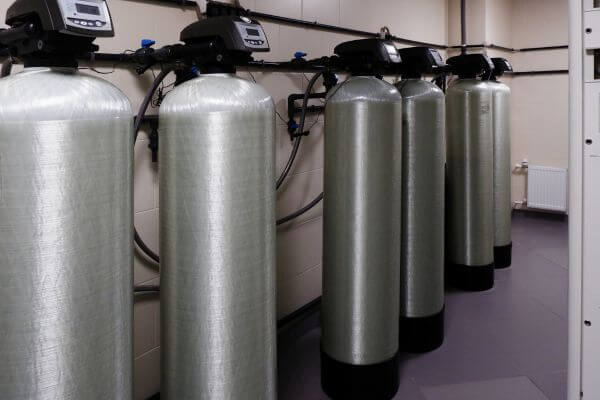
Why Choose Angel Water for Your Hard Water Softener System?
At Angel Water, we don’t just sell water-quality equipment. We believe healthy drinking water is the most crucial aspect of a healthy lifestyle. That’s why we’re passionate about educating people on the dangers lurking in their tap water. Through extensive research and years of industry experience, we’ve learned that nobody’s water is entirely pure, regardless of whether you have city or well water.
When you choose Angel Water, you won’t just be handed a system and told, “Good luck.” We’ll help you install and maintain your new water softener. Plus, we’re here to answer any questions about our products, services, hard water, toxins and more.
Frequently Asked Questions
How much hard water is safe to drink?
Hard water is generally safe to drink without issue. However, it does cause many other problems, like dry skin, itchy scalp and increased maintenance costs for your home appliances.
How many states have hard water?
Most (if not all) states have hard water to varying degrees. Maps of city water and well groundwater have proved that all states have at least a handful of known cases of hard water.
How do I choose the right water softener system?
The right system depends on many things. You need to find a water softener that targets the toxins and contaminants like barium and radium 226/228 that are causing your hard water and will keep up with your water usage. You should also ask your water treatment company if their products have NSF-44 certification. This is a must for a long-lasting water softener that removes radiological toxins.
If your local dealer doesn’t offer this, reach out to us at Angel Water. One of our water experts would be happy to help you choose the right water softener system for your family’s unique needs.
Can my water be hard if I have city water?
Yes. Although well water generally has higher hardness levels, city water can also be hard.
What if I still have questions?
Reach out to speak with us! We’re happy to answer any questions you have!
Start Getting Softer, Safer Water For Your Family and Home Today!
End the frustration caused by hard water and find the solution in the right water softener for your home and family. Contact us today to schedule an appointment to learn more about how we can help you.
Interested in a Water Softener System for Your Home?
You don’t have to live with a dry, itchy scalp and brittle hair anymore! It would be our pleasure to help you find the right water softener to make your showers enjoyable again.
Please give us a call at (847) 382-7800 or visit our water softener page to learn more.

